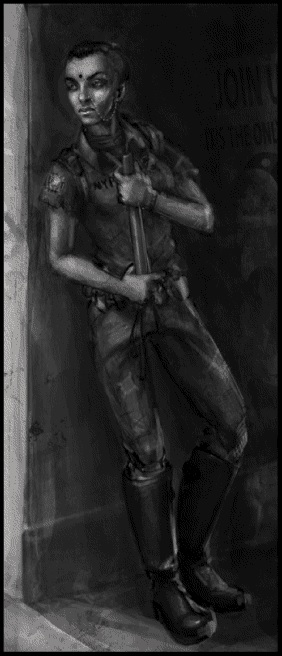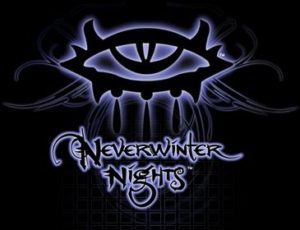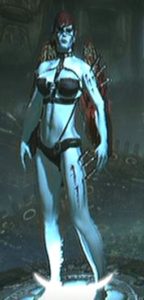There are many articles discussing skill-systems (or lack thereof) in RPGs. How much bonus you get, how to level-up, which you should buy.
This is not one of those articles.

Here I discuss what happens when a PC does not have a skill. Maybe the GM has called for a “History – Elven” roll, or “Electronics Repair”, or even “Climbing”. Scouring your character sheet reveals a large, conspicuous gap where that skill should be. How does your system handle that? Do you get to roll anyway, or automatically fail? Do other skills (“History – Dwarven”, or “Electronics Manufacturing”?) help at all? How relevant are your Stats?
The system our group is currently playing (FWTD) says that all Skills require a level of training, and anyone without this basic requirement (Rank 1) cannot roll, and will automatically fail. Simplistic, and ignoring the Player’s Favourite “Critical Hit”, it does distinguish between people who have invested the time and effort (XP) in learning a Skill, and those who haven’t. Most skills are based on your Intelligence score, and you roll 1d20 +4/Rank-above-One, so if you were allowed to roll, a INT 16 PC wold still have the advantage over a INT 10 PC with 2 Ranks!
Rolemaster takes a similar approach, but instead of an outright Fail, applies quite hefty penalties to unskilled characters. Rolling a d100 + Skill Bonus, and usually wanting to hit 100, unskilled applies a -30 Penalty! Even allowing for a half-decent Stat Bonus (+5 to +15), and a decent roll (70+), you are not getting very far! It does allow for “Critical Hits”, and its Exploding Dice (if you roll 95-100, you roll again and add!) can lead to some outrageous results, even for unskilled PCs.
GURPS has a complex web of default-skills. You don’t have “Electronics Repair”? You can roll “Electronics Operation” at a penalty of 3, or IQ stat at a penalty of 5. Each Skill has a list of which other skills can be substituted for each other, at what modifier. This can be a little cumbersome for novices, but a little work, and a decent character sheet, will soon see it falling into place.
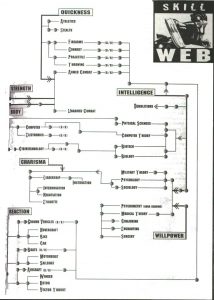
In a similar manner, Shadowrun had its “Skill Web”, where you could trace skills to other skills, and roll with a penalty depending upon how far away on the Web they were. More cumbersome than GURPS, with little to recommend it, this was removed in later editions.
At the other end of the scale is Apocalypse World (and the ever growing list of “Powered by The Apocalypse” (PbtA) systems), that have no Skills. You have 4 Stats, rated -1 to +3, and roll 2d6 plus stat. Trying to fix that broken radio? That’ll be Sharp, unless it is a very pressured situation, when it might be Cool.
The style of game will inform (and be informed by) the Unskilled procedure. Pulp-type games, or “heroic” systems can encourage players to try actions that they are not necessarily trained in, rewarding flair and confidence, whereas “gritty”, “realistic” systems try to penalise PCs for attempting things they have no right to be doing (“I know I’m not trained in Surgery, but what’s the worst that can happen?“).

Another point to be considered is the consequence of failure. If a Fail doesn’t cost much apart from time, and allows another attempt, unskilled PCs will be wanting to Roll anyway, looking for that “Natural 20”. PbtA (and other systems) has distinct problems that arise from failed rolls (e.g. failing a Combat roll means you got hit!), and players will be more inclined to call “Oh, no! I didn’t realise it would be a HOT roll! Can I take that back? Or make it a HARD roll instead?” rather than suffer the Consequence of Failure.
Failure does not always mean “The task is completely failed”. If the GM calls for a Horse Riding roll, and your Urban Hacker has never even seen a horse before being hoisted onto one five minutes previously (no Skill Ranks), this does not mean that they sit there immobile while their team-mates ride off to the Bad Guy’s hideout, but will mean that anyone who has ridden one before (Rank 1 Skill), will get their earlier, in better shape, with a happier horse (unless they roll a Fumble – sometimes a little knowledge is a dangerous thing!)
So next time you’re wondering whether to invest your hard-won XP in a new skill, rather than pushing up an existing one, look to the system you are playing – can you roll a decent Default Skill? Does it open a new set of Tasks you were previously unable to attempt? Does it move you from Inevitable Failure to Almost Certain Failure, or do you reach Possible Success (For Easy Tasks)? Each system has different ways of approaching these things, and they can lead to quite different styles of play.

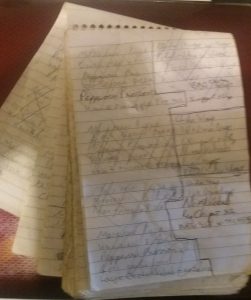


 Vicious, violent and vengeful, the Bleeders keep control of their turf using a little-known variation on Psychic abilities: Blood Magic! By tasting a mere drop of a person’s blood, a Bleeder can gain insight into who that person is, gain some of their traits or skills, track them across the city, and even cause them physical pain!
Vicious, violent and vengeful, the Bleeders keep control of their turf using a little-known variation on Psychic abilities: Blood Magic! By tasting a mere drop of a person’s blood, a Bleeder can gain insight into who that person is, gain some of their traits or skills, track them across the city, and even cause them physical pain! Wizard, Cleric, Thief/Tech, Bard(?). All with a secondary in Fighting (as would be expected for a Violent Street Gang), and at least a minor in Blood Magic (as demanded by their Master). They have a range of skills to bring, and hopefully will be up to the challenge of surviving the mean streets of Manhattan 2080!
Wizard, Cleric, Thief/Tech, Bard(?). All with a secondary in Fighting (as would be expected for a Violent Street Gang), and at least a minor in Blood Magic (as demanded by their Master). They have a range of skills to bring, and hopefully will be up to the challenge of surviving the mean streets of Manhattan 2080!
